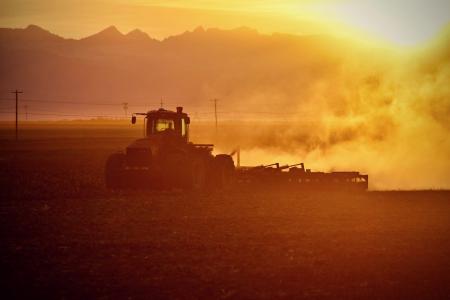Agricultural, Natural, & Working Lands
Climate Goals - Mitigation: Agriculture & Land Management
Colorado’s forests, agricultural lands, and other natural areas play an important role in fighting climate change. Through a process called carbon sequestration, the soil and plants in natural and working lands store carbon and reduce the amount of climate-harming pollution in the atmosphere. By strategically using and managing these lands, we can avoid additional pollution, capture more carbon, and create other benefits including wildlife habitat, recreational spaces, and improved water quality. Warmer temperatures due to climate change, past forest management practices, and other factors are increasing plant pests and diseases, drought, and wildfires, which emit GHG. This makes smart land management practices more important than ever. As a state, Colorado is working to bring forests back into balance and protect agricultural lands and water resources. Taking care of these areas is essential in safeguarding the health and well-being of Coloradans.
State of Colorado Agricultural, Natural, and Working Lands — Goals and Actions
Colorado’s goal is to store one million metric tons of carbon dioxide on natural and working lands by 2030 – the equivalent of taking 215,000 gasoline-powered cars off the road.
Key Priorities
Goals:
With forests covering approximately 24 million acres in Colorado (more than 35% of the state’s land area), properly managing State forests is a key part of reducing emissions and stabilizing natural carbon storage.
Actions:
- Expanding the capacity to grow native trees and plants and improving monitoring and research techniques to help keep forests healthy and resilient to climate change.
- Encouraging private, state, and federal landowners to work together in ways that protect forests from climate change impacts, including drought stress, insects, disease, and wildfires.
- Making the management and use of both forest biomass and forest products (such as lumber) easier, more affordable, and less carbon intensive. Increasing employment opportunities, internships, and work-study programs in tree-planting, forest management, and forest products industries. In particular, this effort focuses on helping members of underserved communities and youth with on-the-ground experience and other learning opportunities to take advantage of these jobs.
Goals:
Land to grow crops (croplands) and raise livestock (rangelands) can both store and produce carbon. By managing these spaces in a climate-smart way, Colorado can help meet its climate goals while keeping the agricultural economy strong and continuing to provide food for the country. Improved soil health and plant diversity allows farmers and ranchers to store more carbon in the ground and increase water retention in the soil, which more efficiently uses water. Farmers and ranchers can also decrease emissions by making their operations more energy-efficient, using renewable energy, and exploring innovative ways to capture and reuse methane.
Actions:
- Offering assistance to farmers and ranchers for using climate-smart soil health practices that keep carbon in the soil, and enhance their ability to store additional emissions in the ground.
- Ensuring agricultural lands continue to be used for growing crops and supporting the people and communities that rely on this sector.
- Increasing on-farm renewable energy and energy efficiency.
- Providing scientific and technical support to assist ranchers and farmers to increase their adoption of climate-smart practices and help develop market opportunities for climate-smart agricultural products.
- Supporting new technologies that capture and reuse methane and other emissions from agriculture.
Goals:
As Colorado experiences frequent and often severe drought conditions, reducing the negative impacts of water shortages is a critical goal of state water agencies. Agencies are also focused on reducing the impact of other water-related hazards, such as flooding, that will occur more often with climate change.
Actions:
- Updating the Colorado Water Plan in 2023 to help the state meet its most critical water challenges. This document outlines specific, collaborative actions necessary to make Colorado a more water-resilient state. For example, the Colorado Water Plan guides water partners, agencies, and communities to secure supplies that provide safe drinking water, improve farm irrigation, mitigate wildfire risk, and restore natural stream channels.
- Creating and administering the Wildfire Ready Watersheds program to assess how at-risk Colorado’s water resources, communities, and critical infrastructure are to the impacts of wildfire and help guide communities to reduce risk before wildfires occur.

